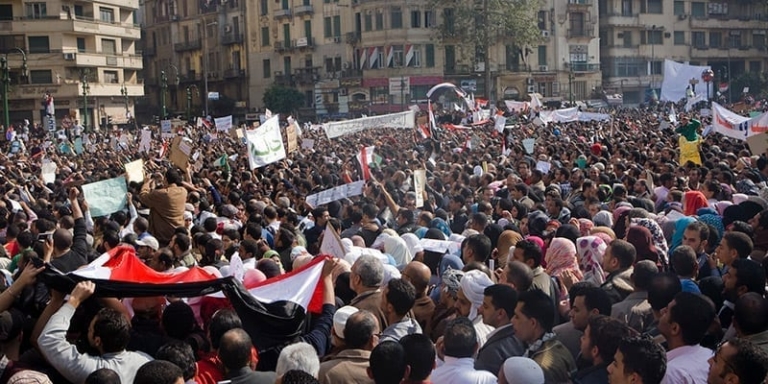
The terrorist attacks of September 11, 2001, spurred debate about the need for reform in the Arab Middle East and North Africa (MENA), leading Western governments and non-governmental organizations (NGOs) as well as international organizations to pay closer attention to the role of civil society in promoting democratization in the region. Since the 2011 Arab uprisings, the link between civil society and democratic development in MENA has become more contested. Due to the key role played by civil society in the uprisings, the region’s authoritarian states have grown more aggressive in silencing and controlling citizen associations in order to forestall mass citizen activism. Still, civil society remains relevant in MENA, despite efforts to stifle its influence. Civic organizations can play a key role, especially in areas where government effectiveness is lacking such as peacebuilding, development, education, women’s rights, and health.
Background
In the MENA region, various factors—including colonial legacies, imposed state structures, perceived security concerns, societal rifts, and elite preference for authoritarian rule—have shaped the political landscape, directly affecting the character and activities of civil society. Often defined as a network of civic actors situated between the state and individual citizens, civil society can be important in promoting political reform, protecting human rights, and providing much-needed services to citizens. Civil society encompasses voluntary associations and non-governmental entities with diverse ideological orientations, ranging from secular-liberal to religious.
Civil society gained traction in the region in the late 1970s, a time of limited economic and political liberalization. In some cases, civil society expansion happened with the support of the ruling regimes, which tended to boost organizations aligned with the state’s developmental goals. Yet civic associations, especially those advocating for democracy and human rights, continue to face oppression, harassment, and legal and financial insecurity, hindering their effective functioning.
During the 1990s, civil society organizations in the Arab world grew significantly with many NGOs being religiously affiliated associations.
During the 1990s, civil society organizations in the Arab world grew significantly with many NGOs being religiously affiliated associations. Their growth was influenced by political, economic, and social trends during a decade of major regional and international developments. After the Arab uprisings, changes in national and regional conditions, including civil wars and other violent unrest in places such as Syria, Yemen, and Libya as well as governments’ repressive counterterrorism policies, led to a significant downturn for many civil society organizations. Many Arab governments tightened NGO laws to restrict their funding and activities. The 2020 Arab Barometer surveys found that MENA citizens perceived their basic rights as diminished compared to immediately after the Arab uprisings. The surveys also revealed a drop in citizens’ perceived ability to participate in civil society organizations, from 64 percent in 2016 to 48 percent in 2020. As the Barometer noted, “Declines [were] found in most countries surveyed, including 38 points in Lebanon, 27 points in Morocco, and 16 points in Jordan. Even Tunisia, the most democratic country in MENA, saw a 12-point drop during this period to just 50 percent.”
Legal and Other Restrictions
Following the 2011 uprisings, many Arab regimes enacted legal changes to enhance their grip on power and to consolidate their authoritarian rule. To counter political threats arising from citizen mobilization, governments introduced even more restrictive NGO laws, put further constraints on the freedom of assembly and expression, and more harshly repressed civil society organizations and activists. The following is a brief exposition of some of the authoritarian tactics some regimes have used against civil society since 2011.
Egypt: In 2016, the Egyptian parliament passed Law No. 70/2017, which tightened regulation of NGO activities and made many civil society activities more difficult. This law imposed penalties including fines and up to five years of imprisonment for offenders. In 2019, President Abdel Fattah el-Sisi ratified Law 149 on Regulating the Work of Civil Associations. This new law eliminated the extended prison sentences included in the 2017 law but preserved other restrictions and added new ones. As Human Rights Watch commented, “The implementing regulations for Egypt’s 2019 law regulating nongovernmental organizations issued on January 11, 2021, underscore the law’s severe restrictions on the work of independent human rights and similar organizations.” Issued as Prime Ministerial Decree 104 of 2021, according to Human Rights Watch the regulations (also known as bylaws) introduced restrictions on civil society work such as forbidding “political” activities or damaging “national security, public order, public morals.” They imposed other constraints and limitations that further eroded freedom of association. As Amnesty International pointed out, the 2021 regulations prohibit NGOs from conducting fieldwork or surveys without official authorization and restrict their collaboration with international bodies without prior government approval. In Egypt, NGOs receiving funding without such approval will be fined.
Jordan: In Jordan, despite constitutional guarantees of freedom of association, laws regulating NGO operations are overly restrictive. The Law on Societies of 2008 strengthened government oversight by allowing the authorities to remove NGOs leadership and disband groups for minor violations. NGOs are mandated to provide the government with their yearly plans, to allow government representatives to attend their gatherings, and to receive state authorization before receiving foreign funding. In 2017, the Cabinet decided that the Anti-Money Laundering Law and the Counter-Terrorism Financing Law applied to civil society organizations. NGOs failing to comply face suspension, fines, or even detention. Although the government introduced a Specialized Committee in January 2020 to streamline the foreign funding approval process, civil society organizations continue to experience delays and obstructionism. It is not surprising that the CIVICUS Monitor, a global civil society watchdog, currently rates civic space in Jordan ‘repressed.’ This rating speaks to the obstacles that NGOs and other civil society groups face in Jordan while trying to meet the needs of the populations they serve.
In Jordan, despite constitutional guarantees of freedom of association, laws regulating NGO operations are overly restrictive.
Morocco: In Morocco, the government has refused to register civil society organizations that it deems critical of Islam and the monarchy. It has used administrative barriers to delay and thwart the registration of organizations it perceives as a political threat. In principle, civil society groups are allowed to obtain foreign funding, but they must report the amount and source of the funding to the government within 30 days or face consequences. The government has frequently obstructed the work of the Moroccan Association for Human Rights, one of the country’s most prominent rights organizations. As Amnesty International has reported, the authorities have targeted civil society activists for their social media posts.
The Gulf: There also are patterns of civil society suppression in Gulf countries such as Bahrain, Qatar, Saudi Arabia, and the United Arab Emirates (UAE). Since the Arab uprisings, Bahrain has significantly curtailed activities of Shia civil society organizations, targeting key opposition figures and imprisoning leaders involved in the country’s 2011 mass protests. In Qatar, the government exercises arbitrary executive powers over NGOs, including the imposition of travel bans without judicial process. The state maintains control over the work, agendas, and funding of civic organizations.
In Saudi Arabia, associations must be approved by the Ministry of Human Resources and Social Development. The government is allowed to disband and abolish groups it deems disruptive to national unity. Human Rights Watch criticized the Saudi legal framework because it “bars NGOs from participating in events outside the country, receiving foreign funding, or collaborating with international organizations without government approval.” Moreover, over the past decade the state has cracked down on members of civil society organizations by using legal structures such as the Specialized Criminal Court (SCC). For instance, in 2013 the government disbanded the Saudi Civil and Political Rights Association (ACPRA), and by 2016 had put all of its members behind bars.
The UAE bans political organizations and trade unions. Law No. (12) of 2017 states NGOs “may not interfere in politics, or incite hatred, sectarian, racial, religious or ethnic conflicts or any issues related to the security of the State and its regime.” The UAE also requires organizations to receive government pre-approval for foreign funding and to open their meetings to state officials. UAE authorities have dissolved associations and imprisoned dissidents. In the UAE, The Pegasus Project revealed widespread surveillance of civil society activists, implicating the UAE as a client of Israel’s cyber company NSO Group, which developed the Pegasus Spyware.
The UAE also requires organizations to receive government pre-approval for foreign funding and to open their meetings to state officials.
Civil Society Remains Key Player
The restrictions mentioned above do not necessarily make civil society in the region irrelevant, however. For example, civil society was essential in shaping grassroots responses to the COVID-19 pandemic in Libya. Local organizations pushed the authorities to implement measures to control the spread of the virus. And despite increased violence, civil society organizations have fostered important discussions on transitional justice.
Similarly, Tunisian civil society groups helped with COVID-19 vaccination campaigns. Before a recent backlash, civil society in Tunisia played a role in pushing back against President Kais Saied’s authoritarian policies. For instance, in 2023 the Tunisian General Labor Union (UGTT), participated, although late, in rallying protesters to oppose Saied’s crackdown on his opponents. In Iraq, civil society constitutes a fundamental part of the opposition. Civic groups were especially important in the 2019 protests. The relevance of civil society in Iraq today contrasts dramatically with conditions during the Saddam Hussein period, when civil society was essentially nonexistent.
The relevance of civil society in Iraq today contrasts dramatically with conditions during the Saddam Hussein period, when civil society was essentially nonexistent.
In Jordan, civil society organizations deliver humanitarian relief and other support for refugees. In Morocco, organizations such as the Association of Teachers of Life Sciences and Earth of Morocco (AESVT Morocco) are raising awareness about climate change, assessing climate threats, and advocating for policy changes to advance sustainable development.
NGOs in conflict areas monitor and report on violations of human rights. In Yemen, organizations such as Mwatana for Human Rights collect essential documentation for “truth-telling and building memory” to pursue justice in post-conflict settings. To navigate government restrictions, civil society actors are also building global networks to document abuses in the region and to share ideas and strategies. Such exchanges of information and expertise among global activist networks has helped MENA NGOs to develop new methods for ensuring accountability.
Civil society organizations continue to be integral to efforts to improve their communities’ economic and social conditions, even though the space in which they operate continues to shrink. NGOs and other civic groups instigate action, however small, on a variety of social issues such as peacebuilding, development, education, women’s rights, and health issues, and environmental concerns.
The views expressed in this publication are the author’s own and do not necessarily reflect the position of Arab Center Washington DC, its staff, or its Board of Directors.

